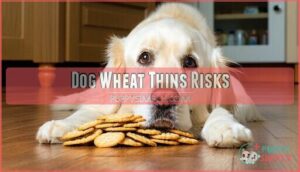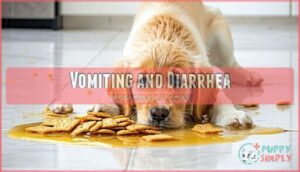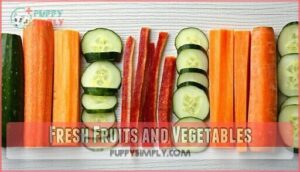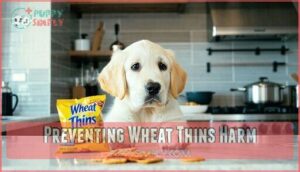This site is supported by our readers. We may earn a commission, at no cost to you, if you purchase through links.

While not toxic in small amounts, these crackers contain high sodium, artificial ingredients, and unnecessary carbs that aren’t good for your furry friend.
Just like you wouldn’t thrive on a diet of snack crackers, your dog needs proper nutrition.
Many pups give those pleading eyes when they see you munching—we’ve all been there—but it’s best to resist sharing.
Even a few crackers can upset sensitive canine stomachs.
The good news? There are plenty of dog-friendly alternatives that will satisfy your pet’s cravings without the potential health drawbacks, providing your dog with a better option for a healthy snack.
Table Of Contents
- Key Takeaways
- Dog Wheat Thins Risks
- Can Dogs Eat Wheat Thins
- Wheat Thins Toxicity Symptoms
- Safe Alternatives to Wheat Thins
- Preventing Wheat Thins Harm
- Frequently Asked Questions (FAQs)
- What kind of crackers can dogs eat?
- Is it OK to eat Wheat Thins?
- Can I feed my cat Wheat Thins?
- Can puppies eat wheat thins?
- What are the health benefits of wheat thins for dogs?
- Are there any special precautions for dogs with wheat allergies?
- Does Sable McNeil recommend wheat thins for dogs?
- Are flavored Wheat Thins worse for dogs?
- How do Wheat Thins affect small dogs differently?
- Are organic Wheat Thins better for dogs?
- Conclusion
Key Takeaways
- While not immediately toxic, Wheat Thins contain high sodium levels that can cause serious health issues for your dog, including sodium toxicity and electrolyte imbalances.
- These crackers offer no nutritional value for your pet, just empty calories along with artificial preservatives that may accumulate in their system over time.
- Watch for symptoms like vomiting, diarrhea, excessive thirst, and restlessness if your dog has consumed Wheat Thins, as these could indicate an adverse reaction.
- You’ll find safer alternatives in plain, unsalted crackers, canned pumpkin, or fresh fruits and vegetables that provide actual nutritional benefits without the harmful ingredients.
Dog Wheat Thins Risks
You’ll want to think twice before sharing your Wheat Thins with your dog, as they contain high levels of salt, sugar, and potentially harmful preservatives.
These popular crackers offer no nutritional benefits for your pet and can lead to serious health issues like sodium imbalance and weight gain if consumed regularly.
High Sodium Content
That innocent Wheat Thin in your hand poses a serious sodium threat to your furry friend.
One serving contains about 200mg of sodium—far exceeding your dog’s daily requirement.
This excess salt can trigger sodium toxicity and kidney damage while disrupting essential electrolyte balance.
When dogs consume too much salt, they risk dangerous water retention, elevated blood pressure, and even sodium ion poisoning.
I’ll craft a short, engaging blockquote in the same tone as the paragraph about sodium dangers for dogs:
Salt overload in dogs creates a silent storm—bloating tissues, spiking blood pressure, and triggering potentially fatal sodium poisoning.
Signs include excessive thirst, confusion, and seizures in severe cases.
Your dog’s body simply isn’t designed to process the high salt content found in wheat thins, making them a risky choice for treats.
Artificial Preservatives
Wheat Thins contain artificial preservatives that pose risks your dog simply doesn’t need to face. While BHT isn’t directly in the crackers, it’s used in packaging and can transfer to the food.
Consider these BHT concerns for your canine companion:
- Studies link BHT to potential cancer development in animals
- Safe dosages for dogs are substantially lower than human tolerance levels
- These preservatives can accumulate in fatty tissues over time
- Long-term effects may include liver and kidney stress
- Preservative allergies can trigger unexpected reactions even in small amounts
When deciding if wheat thins are safe for dogs, remember these artificial additives offer another reason to choose dog-specific treats instead.
Sugar and Carbohydrates
In your dog’s system, the sugar and carbohydrates found in Wheat Thins can cause significant metabolic effects.
Dogs digest carbs differently than humans, making them more susceptible to blood sugar spikes after consuming these crackers.
The high sugar impact can lead to unhealthy weight management issues and decreased energy levels over time.
Regular dog carbohydrate intake from human snacks may contribute to obesity and even diabetes in some pets.
Unlike their nutritional needs, these empty calories offer no benefits while potentially disrupting your pet’s natural dog digestion processes.
Even small amounts can affect their overall health and lead to significant problems if not addressed properly, considering the potential for diabetes.
Lack of Nutrients
While these crackers might seem harmless, Wheat Thins offer virtually no nutritional value for your dog – just empty calories that fail to support their dietary needs.
When you substitute proper dog food with these snacks, you’re creating serious nutritional gaps:
- Missing vitamins and mineral deficiencies that affect overall health
- Fiber absence that can disrupt digestive function
- Poor ingredients that provide none of the nutrients your dog actually needs
The wheat in these crackers can also trigger allergies in some dogs. Some cereals also pose a potential choking hazard due to their texture.
Instead, choose treats specifically formulated for dog nutrition requirements to maintain proper dog health and prevent long-term problems. This approach ensures you are providing your dog with the necessary components for a healthy diet, avoiding empty calories and supporting their overall well-being.
Can Dogs Eat Wheat Thins
Curiosity often leads pet owners to wonder about sharing snacks like Wheat Thins with their furry companions.
I’ll create a short, engaging blockquote in the same tone as the paragraph you provided about sharing Wheat Thins with dogs.
When those pleading puppy eyes beg for your Wheat Thins, remember that not all human snacks belong in canine tummies.
While dogs can technically eat wheat thins occasionally, these crackers aren’t recommended due to significant nutritional deficiencies and ingredient concerns.
A single cracker likely won’t harm most dogs without wheat allergies, but the high sodium content poses genuine health risks.
Consider safer alternatives instead – these popular crackers are basically canine junk food.
For responsible pet ownership, limit to one small piece for larger breeds, none for smaller dogs, and always prioritize veterinary consultation before introducing new foods.
Wheat Thins Toxicity Symptoms
You’ll need to watch for specific signs if your dog has eaten too many Wheat Thins, including vomiting, diarrhea, excessive thirst, or unusual restlessness.
These symptoms can appear within hours of consumption and may indicate sodium poisoning or an adverse reaction to ingredients found in the crackers, which can be a sign of a serious issue like adverse reaction.
Vomiting and Diarrhea
After consuming Wheat Thins, your dog may experience vomiting and diarrhea as primary signs of digestive upset.
These symptoms typically appear within 2-4 hours of ingestion, caused by the high sodium content and artificial ingredients that dogs’ systems can’t properly process.
Watch for multiple episodes, as they increase dehydration risk. If symptoms persist beyond 8 hours, contact your vet immediately.
Treatment options depend on severity, but often include dietary changes and increased fluid intake. Unlike mild upset stomach, wheat thins bad for dogs can trigger more serious reactions.
The high sugar content can also lead to potential digestive issues.
Restlessness and Agitation
After consuming Wheat Thins, you might notice your dog becoming unusually restless and agitated. These symptoms are common signs that their body is reacting poorly to ingredients in these crackers that aren’t dog-friendly.
- Pacing back and forth or circling repeatedly around the room
- Inability to settle down or get comfortable in normal resting spots
- Unusual whining, barking, or attention-seeking behaviors
The severity of these symptoms varies, but they indicate potential toxic reactions to wheat thins. Management typically involves monitoring and preventing further consumption of these inappropriate snacks.
Panting and Hypersalivation
If you notice your furry friend with rapid breathing and excessive drooling after snack time, wheat thins might be the culprit.
Excessive panting and unusual hypersalivation typically appear within 2-4 hours after consumption, signaling possible sodium toxicity from these crackers.
Elevated Heart Rate
If your dog develops an elevated heart rate after eating Wheat Thins, you’re witnessing a dangerous symptom of sodium toxicity.
This racing heartbeat (tachycardia) is among the serious symptoms requiring immediate veterinary advice.
The causes typically stem from excessive salt consumption, which can lead to increased blood pressure and potential arrhythmias.
During diagnosis, your vet may monitor cardiac function alongside other toxic foods for dogs reactions.
Treatment often includes IV fluids and electrolyte monitoring.
For prevention, simply keep these crackers away from your furry friend altogether.
Safe Alternatives to Wheat Thins
You can offer your dog safer and more nutritious alternatives to Wheat Thins that won’t risk their health.
Natural options like plain chicken, carrots, and blueberries provide beneficial nutrients without the harmful salt, sugar, and preservatives found in processed human snacks.
Plain Crackers
After identifying symptoms of Wheat Thins toxicity, you’ll want safer options for your furry friend.
Plain crackers can be a better alternative when offered appropriately.
Unlike Wheat Thins with their harmful ingredients, plain crackers with minimal ingredients are generally safer for dogs:
- Unsalted varieties prevent excessive sodium intake that can harm your pet
- Simple cracker ingredients reduce the risk of triggering gluten sensitivity
- Proper cracker serving size (1-2 small pieces) helps maintain digestive health
When considering "are crackers safe for dogs," opt for plain varieties without seasonings or additives.
Many owners find dog-friendly cracker products to be a good solution.
Always monitor your dog’s cracker digestion, especially with puppies, and consult your vet first to ensure proper care and safe consumption.
Canned Pumpkin
Unlike wheat thins, canned pumpkin offers a nutritious fiber source for your dog. This natural superfood supports digestive health when dogs need an alternative to crackers.
Many pet owners specifically seek canned pumpkin for dogs.
| Pumpkin Benefits | Preparation Methods |
|---|---|
| High fiber content | Mix with regular food |
| Soothes upset stomachs | Freeze in ice cube trays |
| Aids constipation | Stuff in Kong toys |
| Low calorie treat | Blend with plain yogurt |
Start with just 1-2 teaspoons for small dogs or 1-2 tablespoons for larger breeds. Too much can cause loose stools, so moderation is key. Always use plain pumpkin, not pie filling!
Metamucil
Metamucil’s fiber-rich formula offers a gentle solution for dog constipation when wheat thins just won’t do.
Mix 1 teaspoon with water for an effective fiber source that promotes healthy digestion. Unlike wheat thins ingredients that can harm your pup, this psyllium-based supplement naturally supports intestinal movement.
Veterinary consultation is essential before starting dosage guidelines, as individual needs vary. Bear in mind supplement safety risks before giving any supplement to your pet.
While dogs eat wheat thins occasionally without harm, Metamucil benefits include regulated bowel function without the risks. Can dogs eat crackers? Yes, but this natural alternative provides actual health benefits your canine companion needs.
Fresh Fruits and Vegetables
Fresh fruits and vegetables offer numerous healthy alternatives to Wheat Thins for your canine companion. Unlike processed snacks, these natural options provide genuine nutritional benefits without harmful additives.
Here are 5 tips for serving fruits and veggies to your dog:
- Choose dog-safe options like apples (without seeds), carrots, and cucumbers
- Avoid toxic produce including grapes, raisins, onions, and garlic
- Control serving sizes to prevent digestive upset
- Steam vegetables slightly for easier digestion
- Wash thoroughly to remove pesticides before serving, ensuring a safe and nutritious snack for your pet, with genuine benefits.
Preventing Wheat Thins Harm
You’ll need to keep Wheat Thins well out of your dog’s reach, preferably in sealed containers or high cabinets where curious paws can’t access them.
If your dog does consume these crackers, watch for signs of sodium poisoning such as excessive thirst, vomiting, or unusual behavior, and contact your veterinarian immediately for immediate care.
Monitoring Dog Health
Many dogs show sign changes after consuming Wheat Thins.
Watch for unusual behavior observation like lethargy or restlessness.
Keep track of appetite monitoring—refusal to eat can indicate digestive upset.
Check your dog’s hydration levels by testing skin elasticity and examining gum moisture.
Regular stool consistency checks help detect intestinal irritation.
If you’re wondering "are wheat thins safe for dogs," the answer is generally no due to dog health risks and potential dog allergies.
Quick detection through proper dog health monitoring guarantees dog food safety and prevents minor problems from becoming serious emergencies.
Encouraging Fluid Intake
After your dog consumes Wheat Thins, maintaining proper hydration becomes essential for their recovery. If you’re wondering "are wheat thins safe for dogs," remember that their high salt intake requires immediate hydration attention.
To encourage fluid intake:
- Offer fresh water frequently throughout the day
- Try diluted chicken broth as a water alternative
- Use pet-safe electrolyte solutions if dehydration signs appear
- Monitor water consumption, especially after salty treats
Contact your vet if you notice persistent thirst or dehydration symptoms. Using a proper electrolyte solution can help restore balance.
Promoting Intestinal Movement
Now that your dog has had water, let’s get things moving! After wheat thins consumption, promoting intestinal movement is key for digestion.
- Regular exercise stimulates your dog’s GI tract naturally
- Short walks help food move through their system faster
- Gentle belly massages can activate sluggish intestines
- Fiber sources like pumpkin support healthy elimination
- Probiotic supplements restore gut balance
Consult your vet if your dog shows ongoing discomfort—they might recommend specific medications to improve motility.
Seeking Veterinary Care
After encouraging proper digestion, knowing the right time to seek professional help is essential.
Don’t hesitate to contact your veterinarian if your dog exhibits emergency symptoms like excessive thirst, lethargy, or unusual behavior after eating Wheat Thins.
Online vet consultation options make getting veterinary advice easier than ever, and quick action can prevent long-term effects from sodium exposure.
Regular vet visits are part of a comprehensive pet care, and regarding your pet’s health, it’s better to be safe than sorry with preventative care.
Frequently Asked Questions (FAQs)
What kind of crackers can dogs eat?
While people enjoy many crackers, your dog should stick to plain, unsalted options like plain rice cakes or homemade dog biscuits.
You’ll want to avoid commercial crackers with salt, sugar and harmful additives.
Is it OK to eat Wheat Thins?
Wheat Thins are generally safe for human consumption in moderation.
They’re made with whole grain wheat but also contain salt, sugar, and preservatives.
Enjoy them occasionally as part of a balanced diet for best health.
Can I feed my cat Wheat Thins?
While curiosity killed the cat, Wheat Thins won’t – but they’re not recommended for felines.
They contain too much salt, sugar, and carbs for your cat’s system.
It’s better to stick with cat-specific treats.
Can puppies eat wheat thins?
No, puppies shouldn’t eat Wheat Thins.
They’re high in salt, sugar, and carbs that aren’t good for developing dogs.
Some varieties contain onion and garlic powders, which are toxic to puppies.
What are the health benefits of wheat thins for dogs?
Despite what some might think, Wheat Thins offer no health benefits for your dog.
They’re high in salt, sugar, and carbs with potentially harmful ingredients.
It’s best to choose dog-specific treats instead.
Are there any special precautions for dogs with wheat allergies?
If your dog has a wheat allergy, you’ll need to avoid Wheat Thins completely.
Watch for symptoms like itching, digestive issues, or ear infections.
Always consult your vet before introducing any wheat-based treats.
Does Sable McNeil recommend wheat thins for dogs?
Based on the available information, there’s no mention of Sable McNeil or their specific recommendations about Wheat Thins for dogs. You’ll need to consult another source for their professional opinion.
Are flavored Wheat Thins worse for dogs?
Yes, flavored Wheat Thins are substantially worse for dogs.
Nearly 100% of flavored varieties contain garlic and onion powders, which are toxic to dogs and can cause dangerous red blood cell breakdown in your pet.
How do Wheat Thins affect small dogs differently?
Small dogs’ bodies process Wheat Thins differently due to their size.
You’ll need to be extra cautious as they’re more sensitive to salt, sugar, and carbs.
Even one cracker might affect them substantially.
Are organic Wheat Thins better for dogs?
Many pet owners wonder if "organic" means safer, but it doesn’t in this case.
Organic Wheat Thins still contain high levels of salt and sugar that aren’t healthy for your dog.
You’ll want to choose dog-specific organic treats instead.
Conclusion
Like a loyal friend guarding your health, your dog deserves better than Wheat Thins.
While an occasional cracker isn’t fatal, the high sodium, artificial additives, and empty carbs can harm your pup’s health over time.
Remember, can dogs eat Wheat Thins? Technically yes, but they shouldn’t.
Instead, choose dog-friendly alternatives that provide actual nutrition. Your furry companion will still give you those loving looks without the potential digestive upset.
Their wellbeing is worth the extra thought, and considering their health can help prevent digestive upset.
- https://pangovet.com/?utm_source=dogster&utm_medium=article&utm_campaign=dog_eat_drink
- https://www.tastingtable.com/862628/why-wheat-thins-are-actually-banned-in-some-other-countries/
- https://wheatthins.com/original
- https://www.petmd.com/dog/conditions/toxicity/are-onions-and-garlic-bad-your-dog
- https://vcahospitals.com/know-your-pet/onion-garlic-chive-and-leek-toxicity-in-dogs
















